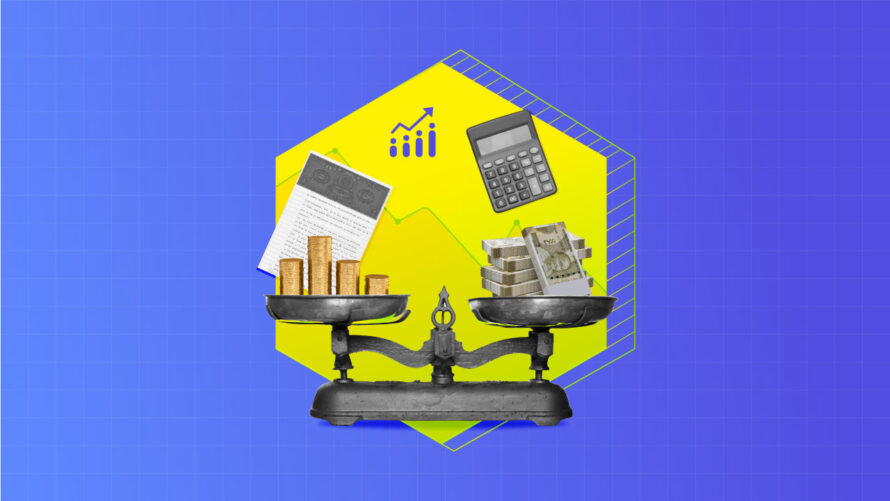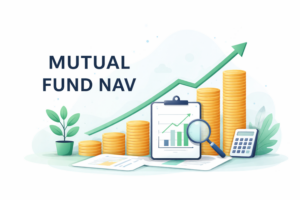Equity vs. Debt Mutual Funds: A primer

If you are new to the stock market, mutual funds are the ideal option to begin with. Direct stock investing is not for everyone as it involves risk and principal loss is possible. Mutual fund investments, we all know, are also subject to market risks, yet in an indirect way. But before you invest in a mutual fund, you should select your preferred type.
Broadly speaking, there are two categories of mutual funds: equity mutual funds and debt mutual funds. So, it is essential to understand what is equity mutual fund and what is debt fund. In this blog, we will discuss everything about equity vs. debt funds to help you make an informed decision.
Understanding Equity Mutual Funds vs. Debt Mutual Funds
Before you decide to invest in mutual funds, you should have a clear idea of equity vs. debt funds. Debt mutual funds invest in debt securities like corporate or government debt. On the other hand, equity funds are primarily equity-oriented investment schemes that invest in shares or equities of various companies.
Furthermore, equity mutual funds are popular than debt funds as they offer greater advantages over debt schemes. The primary advantage of equity mutual fund investment is that it offers comparatively higher returns as it invests in high-risk stocks. Equity funds have longer investment horizons and are typically more volatile than debt funds. However, before you choose one, you must clearly know what is equity mutual fund. Apart from that, you should also know their basic differences and factors you need to consider before investing in each.
Equity Funds
Before understanding equity vs. debt funds, you should learn about equity funds and debt funds separately. In this section, we will discuss equity funds. Equity funds or open-ended equity funds are the most common type of mutual funds in India. These funds allow investors to invest in publicly listed companies with equity shares.
The investment returns of equity funds largely depend on the performance of individual stocks they invest in. The performance of constituent stocks, would, in turn, depend on various factors such as the state of the economy, how well the business is doing, and government policies. It differs from debt funds in terms of investments. Depending on their mandate, equity funds invest in small-, mid-cap, or large-cap companies to generate returns for investors. But these funds come with risks, making them ideal for individuals with a high risk appetite. Equity fund investment is also suitable for long-term investors as it takes time to generate good returns.
Factors to keep in mind before investing in equity mutual funds
In our ongoing equity vs. debt funds discussion, we will explore the factors that you need to keep in mind before investing in an equity mutual fund.
1) Size of the fund
When choosing a mutual fund scheme for investment, be it equity or debt, learning about the fund size is crucial. The fund size usually helps to understand how much money is invested in it. You must consider the size of the fund especially when you are planning to invest a lump-sum in the fund. Smaller funds might perform well in the short-term as one or two good stocks might be outperforming. Small funds also tend to be less diversified and a single stock can be a drag on the performance of the overall portfolio.
2) Expense ratio
Another factor that you must keep in mind while investing in equity mutual fund is the expense ratio. The higher the expense ratio, the more advisor fee you need to pay for the total amount you have invested in the scheme. This can affect your return from the investment.
3) Risk reward ratio
Lastly, evaluating the risk-reward ratio is another vital factor when selecting an equity fund for investment. The risk-reward ratio plays a pivotal role in determining the equity mutual fund scheme you try to invest in as it helps to identify how well the scheme may perform against other investments with similar return proposals over time. A lower risk-reward ratio would be ideal as there is a possibility for higher return on investment with less risk-taking. Conversely, a high risk-reward ratio would indicate that the investment is too risky.
Debt Funds
Now, we will discuss what is debt fund. Debt mutual funds invest in instruments such as debentures, government securities, treasury bills, bonds, and notes. If you are risk-averse and wish to avoid the market fluctuations that impact equity stocks, you can consider investing in debt mutual fund schemes.
Debt funds beat equity mutual funds when it comes to safety. In a declining market, NAVs of equity mutual funds fall drastically, while the fall in debt funds will not be that sharp. However, as with all financial products, no-risk, no-reward principle applies here. Returns from debt funds are moderate, while high-risk equity funds typically offer higher returns over the long term. In short, debt mutual funds are suitable for short- and medium-term investors.
Factors to keep in mind before investing in debt mutual funds
Debt funds are primarily beneficial for investors with low-risk tolerance. However, you should consider some points before investing in debt funds.
1) Expense ratio
Consider the expense ratio of a mutual fund before investing. It is the total expense you pay to make a mutual fund investment, including management fees, operational costs, transaction fees and other charges. Evaluating the expense ratio of a debt fund will help you understand if it is suitable for your budget and investment goals.
2) Management fee
A fund manager usually charges a management fee annually. It is a certain percentage of investment that is deducted as a management fee. If you choose an annual management fee system, the fee will be deducted from your investment amount once every year. Though this might sound expensive, it is actually beneficial in the long run as efficient management ensures good returns.
3) Risk appetite
The term ‘risk appetite’ refers to an investor’s ability to take risks for higher returns. You must evaluate your risk tolerance before investing in a debt fund or any other mutual fund. If you have a low-risk tolerance, you may want to invest in funds that offer fixed returns and have higher expenses. However, if you are highly risk-tolerant, you can opt for funds that offer higher returns and have low expenses.
Equity Fund vs. Debt Fund: A comparative analysis
We have already learned what is equity mutual fund and what is debt fund. Now, we will explore the primary aspects of equity vs. debt funds with the help of the chart given below.
| Aspects | Debt Funds | Equity Funds |
| Investments | Primarily invests in debt securities such as corporate bonds, treasury bills, government securities, and commercial papers. | Invests in company shares traded in the stock market. This, it offers higher returns in comparison to debt or deposits. |
| Investment Horizon | It is suitable for both long-term and short-term financial goals. | It is mostly ideal for long-term financial goals. |
| Taxation | Returns from debt funds will be taxed at the investor’s slab rate no matter the holding period. | If held for less than 12 months, STCG of 20% will apply. More than 12 months, LTCG applies. |
| Returns | Relatively lower returns | Higher returns in the long term |
| Risk Involved | Low to moderate risks involved | Moderately high to high risk |
| Tax Savings | No tax-saving benefit available | Tax savings available for Rs 1,50,000 investment in a year for ELSS funds. |
Conclusion
Investing in mutual funds is a great way to earn money through share market exposure, while also offering the benefit of portfolio diversification. Both newbies and seasoned investors invest in these financial products. Before deciding to choose either equity mutual funds or debt funds, one should remember that when comparing equity vs. debt funds, equity schemes offer higher returns in comparison to its counterpart. We have discussed everything about equity and debt mutual funds to help you identify the best investment option according to your investment goals.
Disclaimer
The stocks mentioned in this article are not recommendations. Please conduct your own research and due diligence before investing. Investment in securities market are subject to market risks, read all the related documents carefully before investing. Please read the Risk Disclosure documents carefully before investing in Equity Shares, Derivatives, Mutual fund, and/or other instruments traded on the Stock Exchanges. As investments are subject to market risks and price fluctuation risk, there is no assurance or guarantee that the investment objectives shall be achieved. Lemonn (Formerly known as NU Investors Technologies Pvt. Ltd) do not guarantee any assured returns on any investments. Past performance of securities/instruments is not indicative of their future performance.







